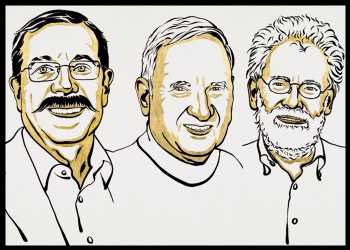Experimental Physicist Trio Win Nobel Prize For Achievements In Quantum Mechanics
Three experimental physicists – Alain Aspect, John F. Clauser and Anton Zeilinger – have won this year’s Nobel Prize for physics for their achievements in quantum mechanics.
Announcing the winners in Stockholm Tuesday, the Royal Swedish Academy of Sciences said the coveted prize was awarded to the trio “for experiments with entangled photons, establishing the violation of Bell inequalities and pioneering quantum information science”.
Using groundbreaking experiments, Alain Aspect, John Clauser and Anton Zeilinger have demonstrated the potential to investigate and control particles that are in entangled states. What happens to one particle in an entangled pair determines what happens to the other, even if they are really too far apart to affect each other. The laureates’ development of experimental tools has laid the foundation for a new era of quantum technology,” the award committe said in a press release.
The ineffable effects of quantum mechanics are starting to find applications. There is now a large field of research that includes quantum computers, quantum networks and secure quantum encrypted communication.
John Clauser developed John Bell’s theorem, leading to a practical experiment. When he took the measurements, they supported quantum mechanics by clearly violating a Bell inequality. This means that quantum mechanics cannot be replaced by a theory that uses hidden variables.
Some loopholes remained after John Clauser’s experiment. Alain Aspect developed the setup, using it in a way that closed an important loophole. He was able to switch the measurement settings after an entangled pair had left its source, so the setting that existed when they were emitted could not affect the result.
Using refined tools and long series of experiments, Anton Zeilinger started to use entangled quantum states. Among other things, his research group has demonstrated a phenomenon called quantum teleportation, which makes it possible to move a quantum state from one particle to one at a distance.
“It has become increasingly clear that a new kind of quantum technology is emerging. We can see that the laureates’ work with entangled states is of great importance, even beyond the fundamental questions about the interpretation of quantum mechanics,” says Anders Irbäck, Chair of the Nobel Committee for Physics.
Alain Aspect, 75, is a Professor at Université Paris-Saclay and École Polytechnique, Palaiseau, France.
John F. Clauser, 80, is a Research Physicist at J.F. Clauser & Associates., Walnut Creek, CA.
Anton Zeilinger, 77, is a Professor at University of Vienna, Austria.
The prize amount of 10 million Swedish kronor, or $0.91 million, will be shared equally between the laureates.
Source: Read Full Article

